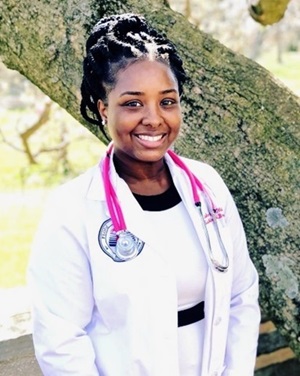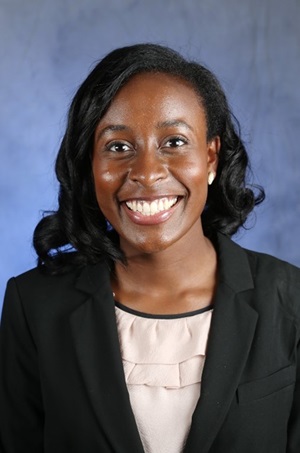"Doctors Who Look Like Me": Interviews with the ASH Minority Medical Student Award Program Awardees
The ASH Minority Medical Student Award Program (MMSAP) provides underrepresented minority medical students with a mentored research experience to advance their careers as hematologists-in-training. Each year, we highlight several MMSAP awardees and their experiences as part of ASH’s robust career advancement pipeline.
First, we interviewed Mahogany Oldham, a third-year medical student at the University of Toledo College of Medicine and Life Sciences, who is an aspiring adult hematologist with a budding research career in sickle cell anemia.
Tell us a little bit about how you found out about the MMSAP through ASH.
Before starting med school, I did a post-bacc program for two years at the National Institutes of Health (NIH). One of my mentors, my principal investigator (PI), was involved with the MMSAP and had let me know about it. When I started medical school and started looking for summer research programs about hematology, it was the number one program I wanted to apply to. My PI at the NIH ended up actually being my mentor for my application, so it totally worked out.
What has the program been like for you?
Once you get the award, you’re immediately drafted into a huge family, and it’s very welcoming. You join a Facebook group and then you meet other medical students who received the award and are doing all sorts of different research. Once you start your research, you get to go out to your mentor’s institution to actually do your research over the summer, and then you get to travel to the ASH annual meeting. The year I was in the MMSAP, I went out to Orlando, and I met a lot of great mentors and hematologists and other med students like me there. I mainly want to treat patients with sickle cell anemia in my career, so I was able to network in the program and meet a lot of other sickle cell doctors who look like me. It was really encouraging to see that and see other doctors that are doing what I want to do and look like me as well.
How did that feel, seeing doctors that “look” like you?
As a minority in medicine, it’s encouraging to see other doctors that look like you because it’s not a minority-dominated field, and with sickle cell affecting a minority population, it’s even more important to feel represented as patients and doctors. It was really important for me because seeing successful mentors helped me to understand that I can actually do this research and I can be very successful making lives better for these patients.
Could you tell us a little about your summer research project through the MMSAP?
My PI through the NIH actually connected me with another PI at Children’s National in Washington, DC, for my MMSAP project who also does research in sickle cell anemia, but mainly focuses on sickle cell anemia in pediatric patients. We studied the immune parameters in sickle cell patients, their immune profile and how to improve their immunity prior to bone marrow transplant. My previous research had been on adult patients with sickle cell, so it was a completely different field of sickle cell for me.
What was that like, studying sickle cell anemia in a different population?
My MMSAP project definitely helped me realize that there are many other avenues to study what patients with sickle cell anemia face in their daily lives, and there are so many other research areas that need to be explored to help our patients.
What advice can you give people who are interested in a similar career path in hematology?
Research helps a lot, and even if you don’t want to do research in the long run, it helps you to understand where we are as a medical field today and what needs to be investigated in the future for certain diseases, whether for sickle cell anemia or other blood disorders. Also, don’t be afraid to try new things. I was doing adult sickle cell anemia research at the NIH, and I was initially unsure about doing pediatrics research with the MMSAP, but I didn’t want to limit myself, and when the opportunity presented itself, I thought it was important to stay open and learn new things for my future career. Networking also helps a lot, speaking to other doctors and hematologists, people who are already in your career path. Try to network as much as you can and meet other hematologists.
Next, we interviewed Zaria Williams, a second-year medical student at the Howard University College of Medicine, who is interested in a career as a pediatric hematologist specializing in the care of patients with sickle cell anemia.
 What led you to apply for the ASH MMSAP?
What led you to apply for the ASH MMSAP?
During my first year of medical school, there was a spreadsheet sent out to us by the class above us with research opportunities in all the different specialties, and I read up on the MMSAP and just decided to apply. I didn’t really know anyone who had done it before, but it sounded like a great opportunity to try something new and that I had no experience with.
Tell us a little about the program and what your experience has been thus far.
The mission of the program is to increase the number of underrepresented minority physicians in hematology, so they provide both a mentorship program and a flexible research experience that you can do over a summer or during an entire year. So, the program provides many different opportunities for students who are on different career paths. I did my research project during the summer, and then I was assigned a career mentor through ASH that I feel like will be one of my mentors for the rest of my medical school and residency. With all this mentorship and research, I really feel like I’ve learned what it’s like to be a hematologist. Even though I wasn’t able to do any shadowing on-site with my mentor because of COVID-19, I did get some clinical experiences working with a hematologist and a pediatric psychologist on my summer research project, and it was great to learn how those two fields work together to take care of patients.
What was your research experience like?
I researched cognitive and emotional factors that may play a role in pain-related health care utilization in children with sickle cell disease; so, why these patients present to the emergency room for pain and if there are any cognitive or emotional factors that may play a role in their pain. We looked at attention, executive functioning, working memory, and frustration about pain, and if any of these might be why patients are more likely to present to the hospital with pain. I worked on my research at Children’s National in Washington, DC, and since pediatrics is my interest, I really wanted to focus on the pediatric population, and I really enjoyed my experience there.
Have you learned any new skills through the MMSAP?
I got to work directly with a statistician on my project and learned a lot about how to do statistical analysis, which was awesome because I did not have any background in statistics before starting the program. I also got to present my research at the 2020 ASH Annual Meeting in December, and so my career mentor and my research mentor both helped me prepare and practice my presentation and I got much better at my presentation skills. Interacting with other hematology professionals and answering questions during my presentation was really helpful and gave me much more confidence for my third year of medical school, when physicians are going to be asking me questions during rounds.
What was it like to present virtually at the 2020 ASH Annual Meeting?
Even though it was virtual, I was extremely nervous, but I feel like I could not have been better prepared by my mentors provided by the MMSAP. I was able to practice in front of my research mentor’s lab as well as another group of hematologists with my career mentor, and I was pleasantly surprised by how encouraging all of the physicians were, and I’m really fond of the hematology community now; everyone is so kind and uplifting and that’s really important to me in deciding about the field that I want to go into.
What impact has the MMSAP had on your career goals?
During the first year of medical school, I definitely thought I was interested in any subspecialty, but the MMSAP definitely gives me more of a focus to seek out more clinical opportunities in hematology, by shadowing more and seeing if I can get an elective in hematology. It definitely encouraged me to keep on pursuing my interests in hematology.
Do you have any advice for fellow medical students who are interested in a career in hematology?
Don’t be afraid to explore all of your potential interests. If you have an inkling that you might be interested in hematology but might like something else, I think you should try the MMSAP out anyway. You will learn a lot, and even if you don’t decide to become a hematologist, you will get amazing mentors out of it. I found that my mentors really want me to become a well-rounded and healthy student, and they want me to have the best chance at success in my future career and as a physician in general. Believe that your voice matters and your contribution is wanted and valued. Even though you may feel like a little tiny fish in a really big pond that is the medical field, we can still contribute, and people still want to hear what we have to say, so just be confident in your voice.
Interviews conducted and edited by Ajay Major, MD, MBA, of University of Chicago, Chicago, IL